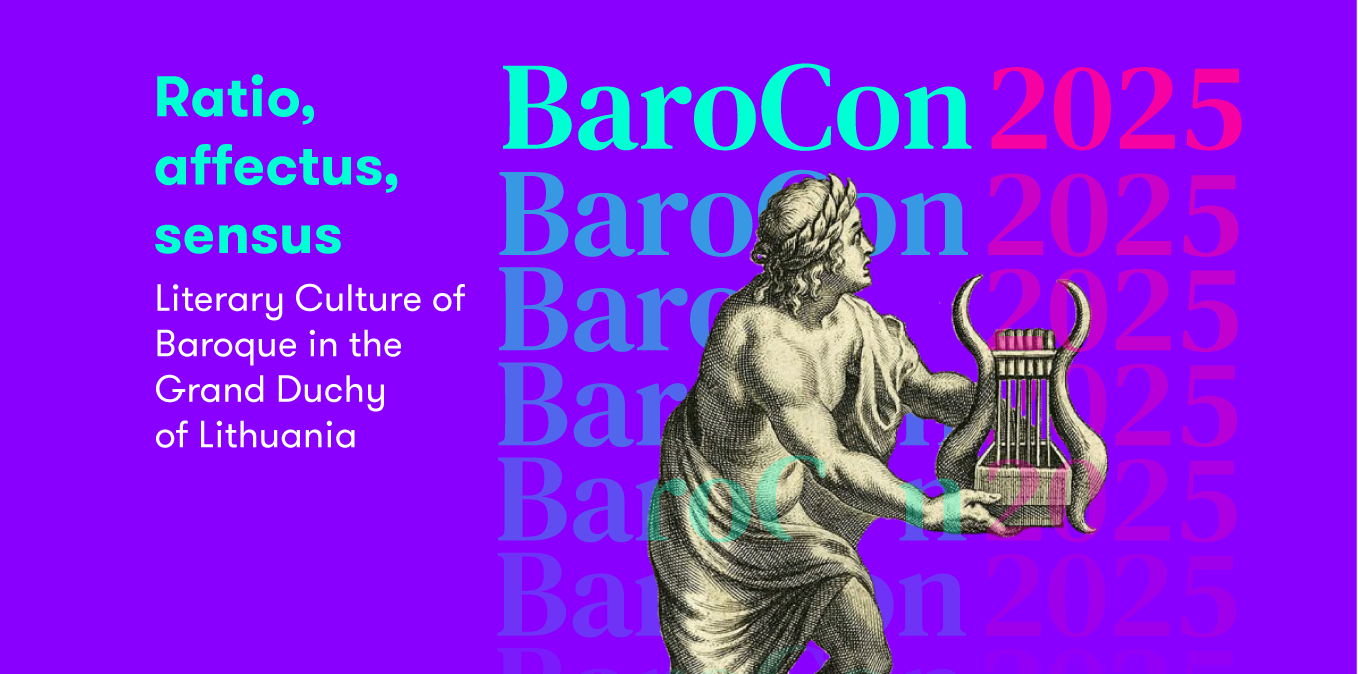Ratio, affectus, sensus: Literary Culture of the Baroque in the Grand Duchy of Lithuania
In 2025, we will commemorate the 400th anniversary of the first publication of Matheus Casimirus Sarbievius' most famous Latin poetry collection 'Lyricorum libri tres' (1625). This has led to 2025 being declared the Year of Baroque Literature in Lithuania. The eminent Jesuit neo-Latin poet of the Polish-Lithuanian Commonwealth, Sarbievius, has been hailed as the Christian Horace and the Sarmatian Horace. His theoretical thoughts on poetry and rhetoric are still highly regarded and have inspired new research on other concurrent themes and authors. This anniversary provides an opportunity to explore the extent and diversity of Baroque literary culture, which has seen a surge of interest in recent decades, both in the academic world and in popular culture. Therefore, the Institute of Lithuanian Literature and Folklore, together with the Faculty of Philology of Vilnius University, is organising an international academic conference "Ratio, affectus, sensus: Literary Culture of the Baroque in the Grand Duchy of Lithuania" on 25-27 September 2025 in the baroque city of Vilnius.
The aim of the multidisciplinary conference is to stimulate discussion on the literary culture of the "long seventeenth century" (from the end of the 16th century to the middle of the 18th century) in the Grand Duchy of Lithuania. This historical period, associated with dramatic changes and a general cultural crisis, is often described in contradictory terms and in constant tension between reason and senses, rigid structure and passions, classifications and impressions, etc. By embracing this contradiction, we invite an exploration of the theme in question through the lens of this dynamic interplay between reason (ratio), emotion (affectus) and the senses (sensus), which can be perceived in various genres of the period, such as poetry, biography, hagiography, rhetoric, private and public correspondence, and so on. The importance of the modern approach lies not only in what it can reveal about the Baroque in the Grand Duchy of Lithuania, but also about subsequent and contemporary literary culture, as scholars have demonstrated the continuing influence of a 'Baroque spirit'.
Event location
25–26 September the conference will take place at V. Krėvė (118) auditorium, Faculty of Philology
27 September the conference will take place at the Church Heritage Museum, Šv. Mykolo g. 9 (entrance from Maironio g. "Arkangelo konferencijų centras")
Keynote speakers

Ona Dilytė-Čiurinskienė
Senior Researcher, The Institute of Lithuanian Literature and Folklore
Prof Stephen Harrison
Professor of Latin literature, University of Oxford
Ilona Kalamon
Józef Andrzej Załuski and Literary Community of the Grand Duchy of Lithuania
Ilona Kalamon
Catholic University of Lublin
Józef Andrzej Załuski and Literary Community of the Grand Duchy of Lithuania
Keywords: publishing market, history of books, Józef Andrzej Załuski, Załuski's library, literary community
The following presentation highlights the profile of Józef Andrzej Załuski, the founder of the Załuski’s Library and the Great Crown Referendary and notably referencing his contributions to the literary community of the Grand Duchy of Lithuania. Załuski’s pursuit of stimulating the publishing market in the Polish-Lithuanian Commonwealth will designate the object of reflection based on his correspondence with figures such as Józef Stanisław Sapieha (the Grand Referendary of Lithuania) and Jan Fryderyk Sapieha (the Grand Chancellor of Lithuania). The range of undertakings include: 1) constituting a reading club called Asocjacja kilkunastu lub kilkudziesięciu uczonych lub w czytaniu nowo wychodzących w cudzych krajach ciekawych lukubracji kochających się osób (Association of a Dozen or Several Dozen Scholars or Persons Fond of Reading Newly Published Works of Interest from Foreign Countries); 2) establishing a relationship with printing houses in Vilnius and importing new publications from Vilnius to the Załuski’s Library in Warsaw; 3) gathering invaluable manuscripts from private collections across the country and 4) establishing a new publishing series titled Zebranie Rytmów przez Wierszopisów Żyjących lub Naszego Wieku Zeszłych Pisanych (A Collection of Rhythms Written by Contemporary Poets or Those of Our Era Who Have Passed Away). A key purpose of these endeavours was to promote the Załuski’s Library and to emphasise Józef Andrzej Załuski’s role as a crucial cultural reformer of the 18th century.


